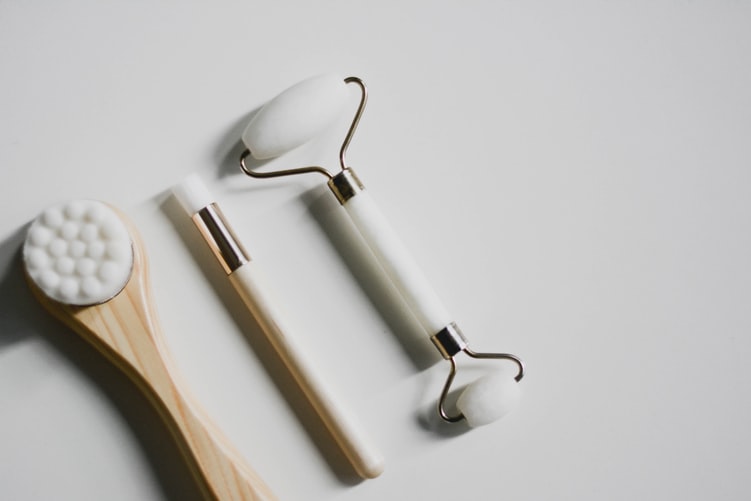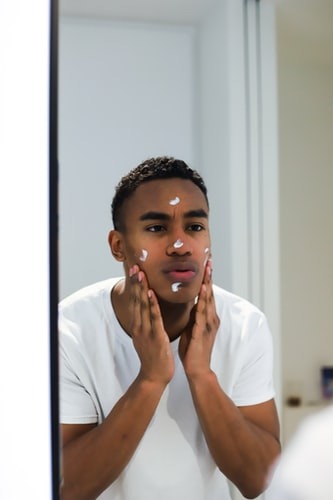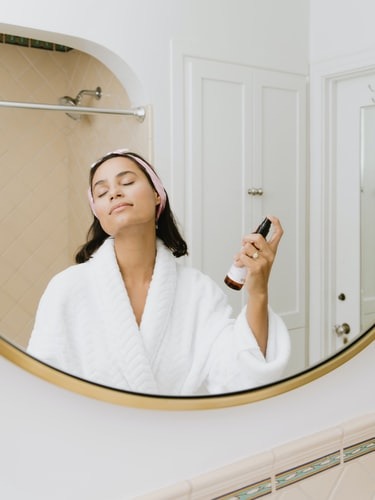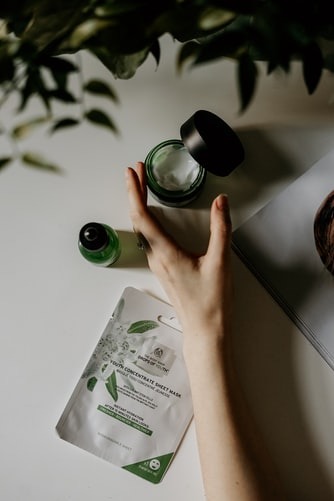Sensitive skin isn’t just one issue, it’s a symptom of other conditions you may not even be aware of. With a few simple updates to you skin care routine, you can keep those sensitivities under control.
There are many things that might be causing your skin to be sensitive. It could be the products you are using, allergies, hormones or all of the above.

What causes sensitive skin?
The Environment
As skin is more exposed to environmental changes, its ability to tolerate foreign substances lessens. Skin irritation generally comes with discomforting symptoms like itching, stinging and burning.
These conditions get worse with exposure to very dry and cold climates.
Aging or Hormonal Changes
Aging is also a cause of sensitive skin, and most of the people who go through menopause have more sensitive skin.
As our skin ages, it becomes much more sensitive to the sun and UV light. It gradually loses the ability to heal itself efficiently which can cause sensitivities.
Additionally, hormonal changes like menstrual cycle and medications can cause our skin to become more sensitive. Getting annual blood and hormone tests are great way to monitor these changes.
Certain Products
Many, many, many products available today come backed with harmful chemicals. Always check the ingredients of the products you use and watch out for these cosmetic chemicals:
- BHA and BHT
- P-Phenylenediamine and colours listed as CI followed by a number code (Dyes)
- DEA-related ingredients
- Formaldehyde (common for preservatives)
- Paradens
- Parfum (fragrance)
- PEG compounds
- Dibutyl phthalate
- Siloxanes
- Sodium Laureth Sulfate
- Triclosan
According to the David Susuki Foundation, products containing these chemicals are not only horrible for your skin, but also the planet. Many of them contain carcinogens, pesticides, hormone disruptors and other toxins.

How to improve and protect sensitive skin
Ensuring our skin is healthy, hydrated and protected is an ongoing challenge but it is possible. For certain symptoms of irritated or sensitive skin there are different solutions.
1. Stay Out Of The Sun
Wearing sunscreen is crucial, especially as we get older. Too much sun exposure not only dehydrate our bodies but also our skin. Additionally, it can lead to premature aging.
Wear a strong sunscreen all over you body but definitely on your face. Wear a hat and/or something to cover the chest and arms. Those UV rays will still get you through your clothes.
2. Don’t Forget To Moisturize
Moisturizers lock in hydration and give you skin healthy fat cells in order to firm and protect your skin. Additionally, they act as a barrier function to offer the skin protection against harmful irritants. Choosing a good moisturizer is the key to healthy skin.
Glycerin is beneficial for skin elasticity and supports skin moisture. Protoanthocyanidins is a great antioxidant found in grape seed oil, and it stabilizes the collagen structure that holds tissues together.
For protection against environmental conditions and UV rays, other antioxidants such as beta carotene, vitamin C and vitamin E are helpful in keeping healthy skin.

@thecreative_exchange
3. Stay Hydrated
Drink a lot of water! The amount you drink per day varies depending on your weight and size. However, it is recommended you drink at least 13 cups or 32 ounces of water a day.
When your skin is thirsty it can become loose, tired and pale. This becomes even more important as we begin to age. Drinking plenty of water keeps our skin firm and plump, not to mention it’s good for our inner-organs too!
4. Get Allergy Tested
Sometimes sensitive skin is a symptom of allergies. Learn as much as you can about your body in order to ensure it is strong and healthy.
Our skin reacts to allergies in many different ways, hives, scaly patches and eczema are all symptoms of an allergic reaction. Not only are these reactions often uncomfortable but they can also cause long-term damages like scaring.
It is important to get allergy tested at least every two years. Our bodies change and even more so as we age. Getting tested for allergies is an important way to stay on top of our overall health.
5. Cold Showers
Heat is a major irritant. From the blazing sun to scolding hot showers, are skin needs a break from the heat. A great way to sooth skin is with cold showers.
Not only does it refresh our skin, it allows it to soak in more moisture as well as keep it tight and firm. If cold showers are too much, simply get a cooling mist or serums to apply throughout the day.
6. Watch What You Eat
There is a lot of foods out there that wreak havoc on our skin. Health skin starts from the inside, so watching what kinds of food we eat is important.
Eating less inflammatory foods like sugar, saturated fats, trans fats, refined carbohydrates, gluten, processed foods and dairy.
Sounds like a lot of food, but this doesn’t have to be everyday. Ensuring a regular diet of fruits, veggies, cold-water fish, healthy carbs, nuts and water is how we keep our skin strong.

Kalos Skincare
@kalosskin
What products help with sensitive skin?
Everyone’s skin is different and not all products will work for everyone or every skin type. However, these are some recommended products that can help with certain skin conditions:
Dry Skin
Dry skin occurs when there is too much loss of water and oil. This can cause our skin to itch, peal, flake and crack.
- Face – Try a lotion that is gentle, fragrance-free and protective. Cetaphil Daily Hydrating Lotion is a good choice for sensitive skin.
- Body – Use a natural oil that will both sooth and not irritate the skin. Shea Butter is a great one!
Eczema
Eczema affects the skins ability to protect itself from germs, air chemicals. It can make our skin extra sensitive and cause dryness, itchiness, swelling and bumps
- Face/body – A moisturize like CeraVe Moisturizing Lotion can help form a protective layer over your skin.
Rosacea
This is common skin issue that affects the face. It can cause redness to the face, ears and chest.
- Face – Using a makeup primer can help correct the look of redness. Smash Box offers a great primer. Additionally, us a fragrance-free, redness combatting moisturizer like Eucerin Sensitive Skin Redness Relief
For Acne treatment speak to your dermatologist. They will be able to help put you on the right path for clear and comfortable skin.

Park Street
@parkstreet
Sensitive Skin Bottom Line
Your skin needs just as much attention as your inner body. It is an essential part of your body, and it needs nourishment and care.
Don’t wait any longer to protect and strengthen your skin. You might want to take short cuts of covering your skin imperfections. However, it is vital to keep a look out for harmful chemicals.
Lastly, speak to a dermatologist for more information on how to take care of your skin!
Up Next … Laser Hair Removal – 6 Things You Need To Know
